Rossbeigh
Rossbeigh, or Rossbehy (Irish: Ros Beithe, meaning 'headland of the birch trees'), is a sandspit with beaches on either side, located approximately 1.6 km from the village of Glenbeigh, in County Kerry, Ireland. It is on the Ring of Kerry, on the Dingle Bay side of the Iveragh Peninsula.[1]

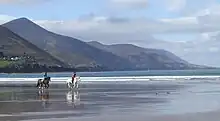
Rossbeigh contains a large volume of sand dunes and herbaceous vegetation.[2][3] It is considered an important habitat for flora and fauna,[4] including wildfowl (salmon and clam are locally farmed).[5]
Rossbeigh strand lies on the Wild Atlantic Way tourist route.[6]
Geography
Rossbeigh, along with the further inshore Cromane strand in the Castlemaine Harbour, and Inch strand off the Dingle Peninsula (an equally long spit with an equally complex and unstable sand dune systems), is one of three sandspits acting as natural barriers against the Atlantic Ocean for Dingle Bay,[7] which is relatively narrow and subject to strong wave forces and deposition of sediment.[5]
Erosion
During the early 2000s, slow but prolonged erosion caused by changes in tidal range, wave height and length, and a reduction in sediment deposits, lead to the receding of some of the dunes.[8] Rossbeigh was breached during a winter 2008 storm when a 1200 ft sand dune was collapse by the sea, splitting the breaking the former two-mile sandspit into two, effectively making the outer part of the spit a tidal island.[9] The Rossbeigh Strand Tower, which had been a landmark to Castlemaine Harbour for over 100 years, collapsed in February 2011. The tower has since been moved to the nearby village of Glenbeigh and restored.[10]
As the split acts as a divide from Dingle bay, the collapse was described in 2020 as putting "homes across the bay at risk as climate change threatened even more frequent extreme events."[11] However, Jimmy Murphy, of the School of Engineering at University College Cork was optimistic that dunes would begin to build back up. In 2020 he said: "people think when you get erosion that the sand disappears, but the sand has to go somewhere. It is deposited — about 10m tonnes — further out, and we feel it will make its way back. There is a huge amount of sand sitting out there, and...we think...that it will eventually make its way back in here and you will get your dunes reforming".[11]
Gallery
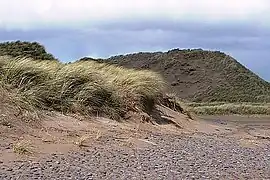 Sand dunes leading to the "back beach" roadway
Sand dunes leading to the "back beach" roadway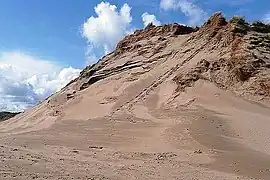 large beach sand dune
large beach sand dune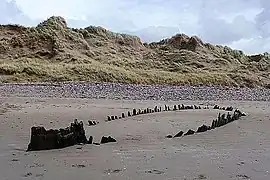 Remains of the 19th century "Sunbeam" boat[12]
Remains of the 19th century "Sunbeam" boat[12]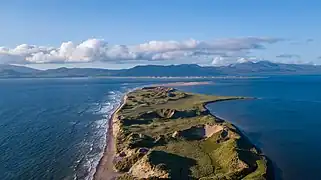 Aerial view of Rossbeigh beach's head
Aerial view of Rossbeigh beach's head
References
Notes
- "Glenbeigh / Rossbeigh". www.theringofkerry.com. Retrieved 21 July 2020.
- "Site Synopsis: Castlemaine Harbour SAC" (PDF). National Parks and Wildlife Service. Retrieved 5 July 2021.
- "Castlemaine Harbour SAC". National Parks and Wildlife Service. Retrieved 5 July 2021.
- "Rossbeigh Beach, Kerry". Wild Atlantic Way Ireland Map and Guide. Retrieved 21 July 2020.
- O'Shea (2015), p. 4
- "Rossbeigh Strand". thewildatlanticway.com. Retrieved 30 September 2023.
- O'Shea (2015), p. 3
- O'Shea (2015), pp. 122, 128, 134
- Lucey, Anne. "Kerry beach erosion lets sea through and creates island of spit at Rossbeigh". Irish Times, 16 December 2008. Retrieved 5 July 2021
- "Volunteers recreate iconic tower in Glenbeigh village". Independent.ie. 2 September 2016. Retrieved 29 September 2023.
- Hoar, Padraig. "Special Report: Hope after all for Rossbeigh sand dunes destroyed by 2008 storms". Irish Examiner, 28 July 2020. Retrieved 5 July 2021
- "Wreck of 19thC schooner Sunbeam laid bare on Kerry beach". BBC, 10 January 2014. Retrieved 11 July 2021
Sources
- O'Shea, Patrick. "Monitoring and modelling the morphodynamic evolution of a breached barrier beach system". University College Cork, 2015
External links
- Rossbeigh.com - information on beach (archived 2023)